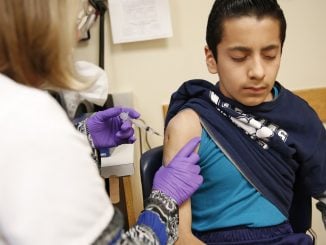RALEIGH — For the past seven months, the coronavirus pandemic has touched every corner of American life and even reached the halls of the West Wing. Yet during that timeframe, the president’s Coronavirus Task Force has worked to bring government and private industry together to develop tests, vaccines, and guidance for the nation.
Recently, North State Journal interviewed Adm. Brett P. Giroir, M.D., who was appointed in 2018 as assistant secretary for health at the U.S. Department of Health and Human Services (HHS). Giroir leads development of HHS-wide public health policy recommendations and oversees several core public health offices, including the surgeon general.
Giroir is a pediatric critical care specialist and physician scientist who has served in a number of leadership positions in the federal government as well as academia. Before taking the role in the Trump administration, he served as executive vice president and CEO of Texas A&M’s Health Science Center.
“In February and March, we only had sophisticated referral laboratories. Today, we’ve done over 120 million tests and easily do over 1 million tests per day,” Giroir said, following an announcement of the BinaxNOW distribution to all 50 states.
BinaxNOW is a what medical professionals call a “point-of-care” test, meaning it does not require instrumentation to test the samples. The U.S. Food and Drug Administration (FDA) authorized the test with particular emphasis on vulnerable populations. The test was developed by Abbott Laboratories and the Trump administration has purchased 150 million of the tests.
In N.C., over 123,000 tests have been sent to the state’s nursing homes.
“It’s a completely different universe thanks to public-private partnerships and calls to action across the country,” Giroir added.
Giroir explained that the BinaxNOW test, also known as a rapid test, is ideal for identifying and preventing outbreaks in places like nursing homes.
He said that persons ill with COVID-19 in the first seven days of illness can take a BinaxNOW test, and it will be “almost as good” as the top laboratory test, registering a 97.2% sensitivity rate.
In explaining the differences in the two types of tests, Giroir said that it’s “not a question of bad or good, just different. They’re best used in different circumstances.”
When asked about the upcoming influenza season, Giroir said the number one thing to emphasize this fall and winter was getting a flu shot.
“The number one thing I can emphasize is please get a flu shot. Flu shots are still your best way to protect against getting the flu and perhaps even more importantly, if you do get the flu despite the shot, you’re much less likely to get pneumonia and get into the hospital and die,” Gioir said. “It’s such a great investment. The Trump administration has increased the amount of flu vaccine available by an extra 20-25 million doses.”
He also said that many of the things done to prevent COVID are also effective at preventing the flu. Giroir said that flu circulation is a record-low in the southern hemisphere, due to populations there washing their hands and wearing masks.
“That doesn’t mean don’t get a vaccine; its low because they got the vaccine and are practicing all those measures,” he added.
Giroir also issued a stark warning.
“Even in a normal year in the winter, hospitals are full of people with influenza. And if they’re full of people with influenza, how are you doing to put people with COVID in there?”
“This is a very serious situation that I want everyone to take ownership of. If we do have a bad flu season, if people don’t wear a mask, wash their hands, and get a flu shot, it really could be problematic,” he said.
He also advocated for ensuring the elderly get flu shots and said it was something to empower Americans, not to stoke fear.
NSJ also asked Giroir to look towards a post-COVID future, specifically if things like wearing face coverings could be part of American life moving forward.
“You know, that’s a very good question, and no one’s really asked that. It’s going to take us a while when we have a vaccine to get everyone vaccinated and there’s going to be populations where it may not work,” said Giroir.
He said it would be likely that a COVID-19 vaccine in children would need to be delayed, so trials can ensure they’re safe and effective in adults first.
“We’re going to be wearing masks for a while. As far as when COVID is over, I think that’s a very interesting question. Asian cultures have a mask-wearing culture where they wear masks normally with flu season,” he said of the long-term potential of masks.
“Remember, even in a normal flu season, 30,000 Americans die and sometimes upwards of 70,000 or 80,000. So, it’s not an awful idea. There are drawbacks to it, some people really don’t like it; I think it’s an interesting question, and it’s not a bad idea. It can help protect you and others from a number of issues, not just COVID. We’ll have to see what happens,” he said.
When asked if he had any other tips, Giroir said that “washing your hands is good no matter what” and that the flu is spread via droplet particles spread by sneezing and getting on others’ hands and surfaces.
“COVID is a little more infectious with aerosols, but not totally infectious like measles or chicken pox in closed spaces,” he added.
Finally, Giroir offered a tip — diluting bleach one to 10 times and using a paper towel can be a good substitute for using Clorox wipes, which have become hard to find. “Soap and water does a pretty good job too,” he added.



